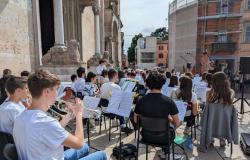The editorial staff of AffarInternazionali spoke with Jeremy Quin, President of the Defense Commission of the British House of Commons, on the occasion of the meeting held at the IAI between a delegation from the Commission itself and the Institute’s research team. The meeting focused on Italian-British cooperation regarding a wide range of military, industrial and geopolitical dossiers starting from the Global Combat Air Programme, and was part of the official calendar of appointments of British parliamentarians who met their Italian counterparts, the leaders of the Ministry of Defense and Leonardo.
Our visit to Italy
The main goal of our visit is to talk about GCAP, which we think is incredibly important. There is a joint agreement between the Italian, Japanese and United Kingdom governments for the creation of the GCAP, a sixth generation combat system. With it, we move from traditional aircraft and platforms to a world-class and enormously advanced combat air system, in which data will be absolutely critical. It’s an important step forward. I am a former Minister for Defense Procurement in the UK: we have a very strong relationship with the Italian Armed Forces and industry, and the combination of Leonardo, BAE Systems and Mitsubishi Heavy Industries is extremely strong. This is an incredibly innovative project: it will require a lot of resources and a lot of qualified staff, but it is very stimulating and the timeframe is tight between now and 2035. In the UK, this project enjoys cross-party consensus and we are evaluating what the results will be, the timing, the methods of collaboration with the industry. We talked about all this in our meetings, which were attended not only by my counterpart, the President of the Defense Commission in the Chamber of Deputies, but also by the head of the Air Force and his colleagues. Both were very reassuring: we now know that Italy has the skills, capabilities, budget and willingness to collaborate as equal partners with the UK and Japan. This was the main purpose of our visit.
However, we also touched on other areas. We live in very dangerous and worrying times. For me, like for most of my peers, the most important political moment of our lives was 1989. I was a student when the Berlin Wall fell and it was an intense time. Considering all the fears of the previous years, suddenly this turning point came and we could breathe again. This event had implications for many areas of defense and foreign affairs, influencing how our armed forces were designed and resourced in subsequent years. Defense spending has decreased in all NATO countries. Of course, we are used to having extremely active defense forces, and both the Italian and British armed forces are so globally. Italy does a lot to support international efforts in peacekeeping and other ongoing international projects, including in the maritime sector. However, my committee is very concerned: we have published a report on our preparedness in the event of the worst-case scenario involving NATO – and the possible triggering of Article 5 – in a protracted, high-intensity war. And we all agree that the way to avoid war and preserve peace is to prepare for war: a Latin motto, originally, valid 2,000 years ago and still today. We are therefore thinking about what the UK needs to do and making recommendations. I am aware that this is a debate that is also taking place in other European countries, as we all need to think about how to ensure the right level of collective resilience, which means having the qualified personnel, ammunition stock levels and advanced capabilities to discourage any risk of worst-case scenario. In this context, it is very positive that the UK, Italy and the whole of Europe have a solid position on Ukraine, because this is – and it is an absolute tragedy – a ferocious war taking place on our continent with appalling consequences . It is very positive that Europe acted collectively in support of a sovereign and independent country, which was the subject of this brutal attack. This is an aspect that certainly pushed us to communicate our gratitude, because this union sends a clear signal.
However, we are aware that there are other challenges in the world. I know well that Italy has components of its Navy (a destroyer, a frigate) that operate to try to protect civil navigation in the Red Sea. Like Italy, we too are a maritime nation and for us it is absolutely essential not only to protect the lives of civilian seafarers, but also to ensure that the flow of trade through the Red Sea and from that critical hub from Europe to Asia you keep scrolling, without interruptions. We perfectly understand the Italian position, which wishes to contribute, together with its European allies and the broader Western alliance, to protecting maritime transport. It is a clear priority for all of us.
The United Kingdom and Ukraine
The UK may not be a member of the EU, but we are still an integral part of Europe. This has not changed in any way. We, like Italy, are absolutely fundamental members of NATO. When it comes to our common defense, there is much that binds us. NATO has obviously grown in size since February 2022 and this is very positive. I really appreciate that the EU has provided support to Ukraine. Italy has done so in terms of shipments of military equipment, as has the UK. I think there is a clear recognition that, in the EU or outside the EU, this is our continent and the Russian one was a terrible, barbaric attack on a sovereign state. It is therefore absolutely recognized that we must react appropriately, supporting the Ukrainian government.
The United Kingdom and Italy
I have no intention of going beyond my area of expertise, which is defense. In this field, our industries work very well together. I have been on the Tornado and the Eurofighter: here we have a strong collaborative relationship and our services work closely together. I’ve seen this particularly with the two air forces, where there is a very strong relationship. Furthermore, there are a number of NATO missions where our services work closely together, with an Italian deputy commander and a British commander, or vice versa. And it works well. So, in the field of defence, there is clearly the opportunity to do more, and we are seeing this in the GCAP, with which the UK, Italy and Japan, as equal partners, have undertaken an incredibly inspiring project, but it is also a great undertaking: we must move from the fourth generation of Eurofighter to the sixth generation. We will make it, it will be a great success. But all three countries need to be really focused on achieving the goals. The advantage of our meeting today is that we have the absolute certainty that the government, the parliament and the Italian air force are directing their energies precisely in this direction, and it is a pleasure to see it.
(this article is also published on AffarInternazionali)






